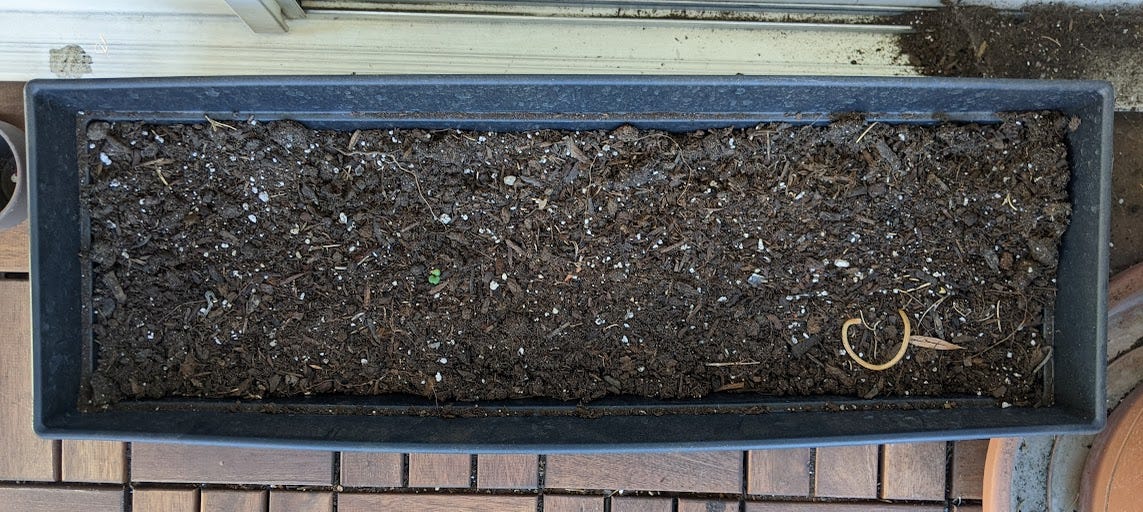Hello, my friends,
The news of the week is that two of the radish seeds I planted a week or so ago have made their way to daylight! Much excitement! Now I’m wondering what’s going on with the other four or five I stuck in there. Hopefully a few more will pop up in the next few days.
Another bit of news is that on Friday, the Kagan family will be attending a Hanukkah dinner at a local synagogue! I’ve only gone to a synagogue a handful of times in my adult life and have never been a member of a religious community before so this is almost all new for me. Almost, because I have had dinner before. Furthermore, it’s been a while since I’ve spun a dreidel, so I’ll have to review the rules. As a sidenote, Michael learned the dreidel song in school, which is pretty neat.

Medi-rant
Sure, everyone complains about healthcare in the United States, but my mother has been in the hospital for the past two weeks and what I’ve seen has been concerning so I, too, need a moment to kvetch. It’s not the hospital itself, which is beautiful, and not the demeanor of the staff, who are mostly friendly. It’s the motormouth doctor who has tried to discharge my mother twice without a proper diagnoses, the same doctor who finds it a burden to spend a few minutes updating the family by phone because she has “too many patients.” Instead, she does her rounds and loads her too many patients with information that they may or may not understand at a time when they are in pain and hopped up on drugs. It’s not right the right way to do things.
We’re lucky. My mother has been in the medical field for most of her life and we have family friends who are knowledgeable about medicine. Furthermore, there are a bunch of us visiting regularly and making sure proper care is taken and rash decisions (pun intended) aren’t made by a doctor who hasn’t the inclination to spend the proper time with people. We have privilege on our side — knowledge, time, and no awe about medical personnel. We can figure out the questions to ask and demand the answers. We can appeal decisions when necessary.
My heart is with the people who find themselves in a hospital with no advocates and no knowledge, ill and unable to affect a situation that is completely out of their control. Here we have not a patient but a victim at the whim of whatever may come: An overworked doctor, cost-cutting administrative policies, inattentive nurses create a dehumanizing fugue.
Sure, most people recover and many hospitals (like the one my mother is in) are the opposite of the death-traps of several hundred (or even fifty) years ago. And yet, the line between optimal care and “ship ‘em in/ship ‘em out” culture seems very thin. Thankfully, my mother is moving towards recovery, but what would her health outcome have been had we not been there to influence her treatment? It’s a scary thought.
A Novel Thought
Two days ago, I finished listening to the audiobook of A.B. Yehoshua’s novel, A Women in Jerusalem, about a HR manager tasked with following up on the life of a former employee who was killed in a terrorist bombing. This is my first book by Yehoshua, but it’s clear to see that A Women in Jerusalem is a good novel written by a master of the craft. About a third of the way through, the protagonist lies down to sleep and Yehoshua switches to an expository mode, offering one of the best descriptions of what fiction writers do, starting particularly with the second paragraph:
For us, though, the flame goes on burning. It entices us, whirls and spins us through space and time, dream-bearers for a man in his late thirties, an ex-army officer, a divorced father of a teenage girl, a personnel manager charged with a unique mission, who now, at the first stop of his journey, in the barracks of a once secret military base that has become a draw for tourists, lies on a thin mattress, wrapped in a foreign army blanket. Although we feel his urge to dream a dream, is it possible, in all his weariness, with the steady rasping of the sleepers around him, to give him one that will be meaningful—one that he will remember and even describe to others?
That’s our job. We, the agents of the imagination, brokers of phantasms, are here to produce a dread and marvelous dream. Already we hover above shut eyelids, slip into the rhythms of the breath, stir forgotten childhood wishes into the remnants of yesterday, blend anxieties with fabulous desires, mix jealousies with memories and longings. Microscopic and transparently elusive, we pass, tiny dream nematodes, compactions of dissimulation, through the tough outer membranes of the soul.
And although we are all here for the same purpose, none of us knows any of the others. Incessantly we change our disguises. Two old childhood friends merge into a single youth. A conscript killed by a stray bullet returns as a company sergeant. The former foreign minister, now a next-door neighbor and possibly a cousin, is in attendance, too. And there are others, total strangers with no identifying marks, like a woman our souls go out to as she passes in the street.
It’s twitching into life, this dream of ours. The eyelids flutter as the opening scene appears. A sigh is stifled. A leg shoots nervously out from under the blanket, followed by the other moving more slowly, as if someone were taking a first step, or, better yet, beginning a descent.
Good luck.
Good luck.
The Purge
After I finish writing this newsletter I’m going to go into my Libby and Hoopla (online library services that I use mostly for audiobooks) and purge years of “favorites.” Have you ever done anything like this? I never have. But really, some of those titles have been on those lists for nearly a decade. If I haven’t found the desire to read them in ten years — and it’s not a matter of forgetting, I look at those lists regularly — am I really going to choose them in the next ten years? Probably not.
Many of those titles were selected when I was interested in a particular topic and “favorited” multiple titles, read and removed some of them, and left the stragglers. Now they’re just dead wood in my mental shed. Still, it’s not actually a matter of necessity to purging the lists since it’s not like they take up shelf space. More so, it’s an acceptance that I’ve moved on. The titles will remain in the library’s collection, I’m sure, so if I ever want them they’ll be there. The difference is that I’ll have to actively search for them. And maybe absence will make the heart grow fonder?
Next time we meet, say hi to the newer, lighter me! The New Year is coming!







Purge, definitely. I too am a digital hoarder, and I've been purging steadily as well. it's tricky, beause digital stuff takes up no "space" except of course it takes up the most important space which is mental space.
I purged almost all my physical books a few years ago, keeping only the ones that I knew woudln't be easily replaceable. THere's only one that I've had to rebuy. And that's me now not living with access to a library and having to buy everything I read online.